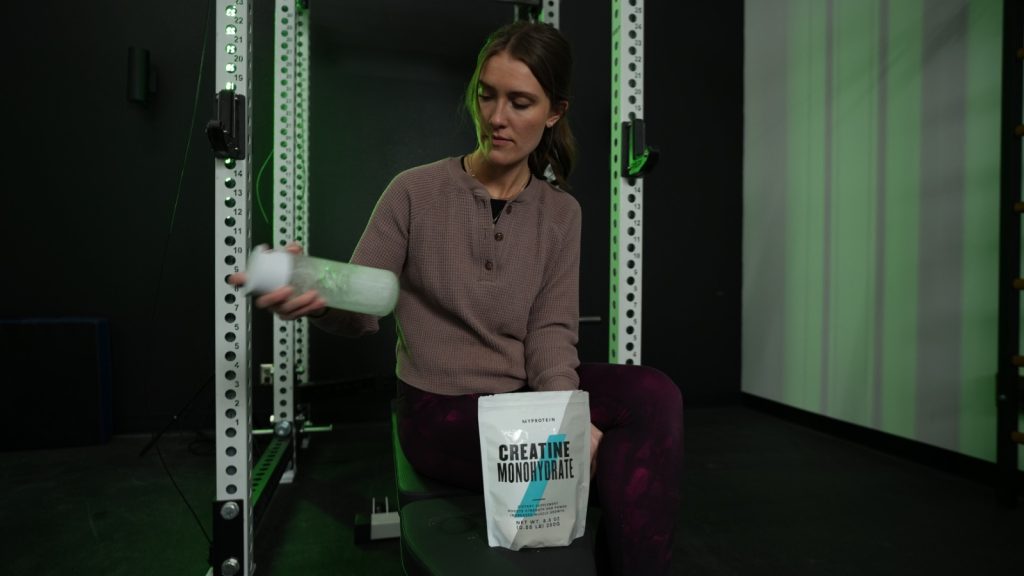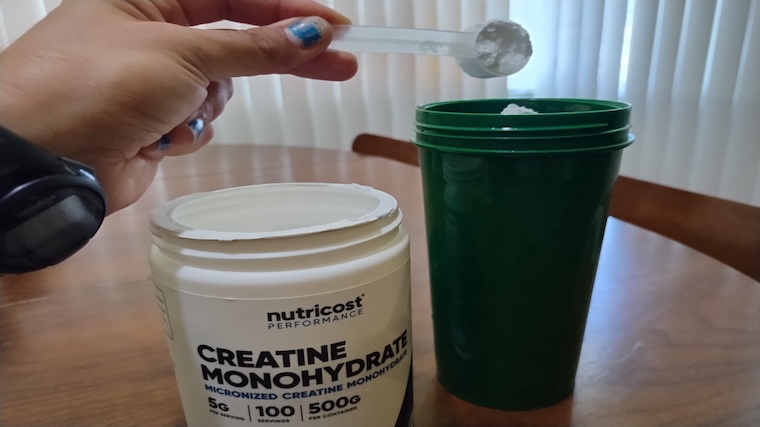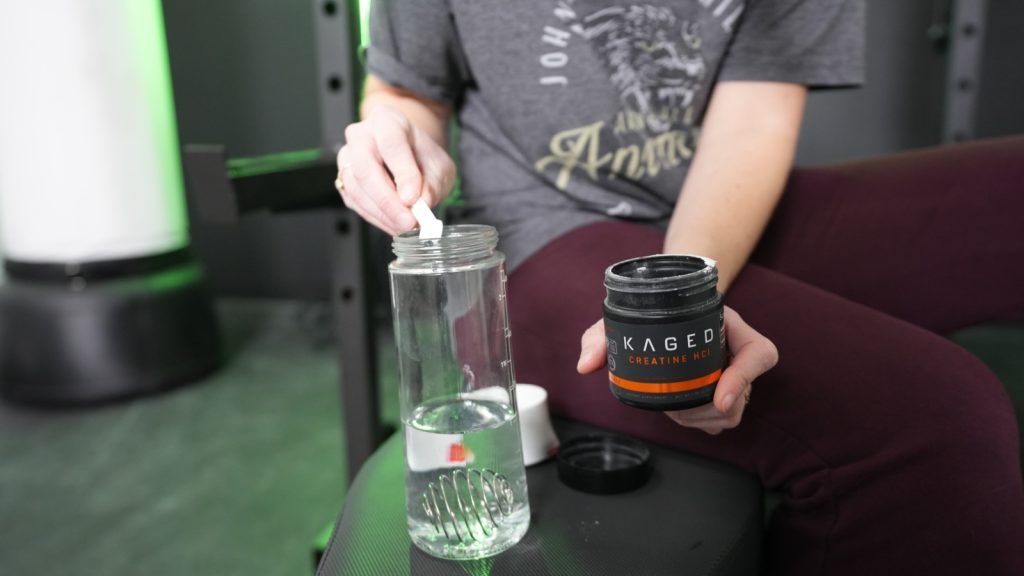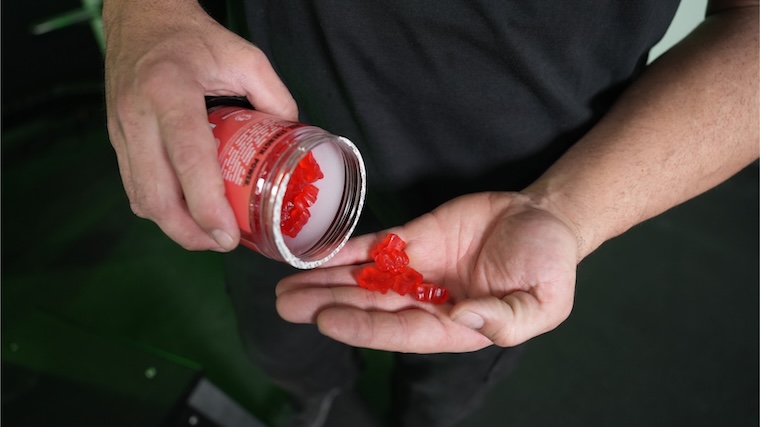Creatine is one of the most effective and widely studied sports supplements, with a strong reputation for maximizing strength, power, and muscle gain. It’s no surprise that you can find a staggering variety of brands and formulations when looking for the best creatine supplement. And with so many different forms available, you might be wondering which would be best for your goals.
Whether you’re aiming for greater strength, faster sprints, or more muscle mass, you want to make sure that you’re investing wisely in your supplements. Although the various types of creatine may sound equally appealing due to flashy marketing, some forms are more effective than others. In this article, I’ll break down the research on the potential benefits of nine types of creatine supplements so you can choose the one that best aligns with your goals.
Key Takeaways:
- The most widely used form of the supplement is creatine monohydrate. (1)
- Creatine monohydrate is the most effective form of creatine supplementation. (1)(2)(3)
- The recommended dose of creatine is 3 to 5 grams daily. (1)
- Creatine is naturally stored in muscles and plays a key role in producing energy for muscle activity, enhancing exercise performance and muscle growth. (1)
Medical Disclaimer: The content on BarBend is meant to be informative in nature, but it should not be taken as medical advice. When starting a new training regimen and/or diet, it is always a good idea to consult with a trusted medical professional. We are not a medical resource. The opinions and articles on this site are not intended for use as diagnosis, prevention, and/or treatment of health problems. They are not substitutes for consulting a qualified medical professional.
What Is Creatine?
Creatine is a naturally-occurring, nitrogen-containing compound. It’s primarily stored (in the form of phosphocreatine) in skeletal muscle, but small amounts are also stored in the brain, kidneys, liver, and heart. (1)(3)
Creatine plays a key role in energy metabolism by donating its phosphate group to replenish adenosine triphosphate (ATP) in order to power cellular functions. This provides a quick but limited energy source for high-intensity, short-duration activities like sprinting or strength training. (1)(3)
The body produces its own creatine, and foods with creatine include meat, poultry, and fish. Supplementation can boost performance by saturating muscle cells with creatine, enhancing their ability to replenish ATP. (1)(3)
What Are the Benefits of Creatine?
Creatine may be best known for its impact on athletic performance, but creatine could also help to prevent or recover from injuries, and may even benefit the brain. (1)
Creatine benefits can include improved sprint performance, increased muscle strength, and a higher training volume (or the number of reps in a session). (1)(3) “Creatine supplementation is a powerhouse for strength athletes, particularly in high-intensity, intermittent resistance, or power activities,” Melissa Boufounos, CHN, tells BarBend. “Creatine may allow athletes to tolerate more intense training periods.”
Some studies suggest that creatine supplementation may lead to lower markers of muscle damage after a workout, meaning that it can potentially support recovery, but these results aren’t consistent between studies. (4)(5)

The brain also uses creatine, and supplementation may improve recovery after a traumatic brain injury (TBI) that can occur in high-risk athletes such as football players. (6) In groups with lower creatine stores, like vegans and vegetarians, as well as older individuals, creatine supplementation could potentially boost certain cognitive abilities. (7)(8) Research suggests that creatine may also preserve cognitive function, attention, and working memory in sleep-deprived athletes. (9)
According Boufounos, “Creatine supplementation is widely recognized as safe when used correctly, but it’s important to address some common misconceptions. Some users worry about potential side effects like kidney damage, hair loss, dehydration, and muscle cramping, but the current body of evidence does not support these concerns. To minimize risks, athletes should stick to recommended doses, stay well-hydrated, and consult with a healthcare professional, especially if they have pre-existing conditions.”
9 Different Types of Creatine
Now that we’re clear on the benefits of creatine, how do you know which type to buy? Some claim to cause less water retention while others boast better absorption rates. Let’s dive into the scientific evidence to explore the different types of creatine.
1. Creatine Monohydrate
Creatine monohydrate is not only the most well-researched form of creatine, it also has the greatest physiological impact and it’s usually the most cost-effective option. (1)(2)(3)

Creatine monohydrate is produced by binding creatine to a molecule of water, then crystallizing the creatine molecule to form a powder with one of the highest concentrations of creatine (about 90%) It’s extremely shelf-stable (as long as it stays dry), highly bioavailable, and resistant to degradation during the digestive process, so over 99% of the ingested creatine will be absorbed. (3)
If you’ve ever tried to mix creatine monohydrate in cold water, you might have noticed that it doesn’t dissolve well. While its lack of solubility can make your beverage a little gritty, this doesn’t affect its absorption or efficacy. You could even try your creatine monohydrate supplementation with a hot drink for better mixability and equal effectiveness. (3)
[Related: Best Creatine For Men]
2. Micronized Creatine
Micronized creatine is one example – of many – where manufacturers are marketing an “improvement” on something that already works (and isn’t actually improved by the change). The only difference is the size of the particles, which are, as the name suggests, smaller than what you’ll find in regular creatine monohydrate. (2)
This form of the supplement is sometimes made from creatine monohydrate, but other types also exist. While manufacturers claim this improves solubility, there’s little evidence to support that claim. Also, solubility doesn’t affect absorption. (2)(3)
3. Creatine Ethyl Ester
Despite the fact that over 99% of the creatine in creatine monohydrate is absorbed, creatine ethyl ester was alleged to have even better bioavailability. As it turns out, however, research suggests that this form is less bioavailable and less effective than creatine monohydrate. In fact, at the end of one study, serum creatine concentrations were higher in the placebo group compared to the group taking creatine ethyl ester. (10)
4. Creatine Hydrochloride (Creatine HCL)
Creatine hydrochloride is more water-soluble than creatine monohydrate, meaning it dissolves better. Its production also requires less time and water, which could be considered beneficial for the environment. (11) There are several products incorporating Creatine HCL, such as Kaged Muscle C-HCl Creatine Hydrochloride and CON-CRÈT Creatine HCl.

However, as I mentioned previously, better solubility doesn’t translate to greater efficacy. Based on the limited research available, creatine hydrochloride is no more effective than creatine monohydrate. (2)(12)
5. Buffered Creatine
The buffered form of creatine — also known as kre-alkalyn — is produced by adding an alkaline powder, like bicarbonate, which ostensibly “corrects” its pH and protects it from degradation during the digestive process. (Considering that less than 1% of the creatine in creatine monohydrate is degraded to creatinine during digestion, this hardly seems like a problem to be fixed.) (13)
Despite the extravagant claims made by some manufacturers, buffered creatine is no more effective than creatine monohydrate, nor does it cause fewer gastrointestinal issues at high doses. (2)
6. Liquid Creatine
While creatine monohydrate boasts substantial stability when dry, it becomes less stable in liquid. Surprisingly, it’s less stable in water than it is in your stomach because degradation is halted at very low and very high pH levels. Whereas the pH of gastric juices range from 1 to 2, the pH of water is 7, and you won’t find a beverage with a pH low enough or high enough to prevent creatine degradation. (1)
In other words: once you put creatine monohydrate powder into a beverage, it will begin to degrade to creatinine. This explains why creatine-containing beverages are less effective than creatine monohydrate that’s hydrated and ingested immediately. (14)
[Related: Best Creatine For Women]
7. Creatine Magnesium Chelate
Creatine magnesium chelate binds creatine to other molecules to improve its stability and prevent its degradation to creatinine. Though one long-term study showed that this form of creatine improved sprint performance in elite athletes, it wasn’t compared to other forms of creatine. (15)
So, it’s unknown whether creatine magnesium chelate outperforms creatine monohydrate, but this claim is based on the notion that less creatine will be degraded to creatinine during digestion. Considering that less than 1% of ingested creatine is degraded, and degradation is actually halted in the stomach, it seems unlikely that this modification will lead to meaningful changes in creatine absorption.
8. Creatine Phosphate
Creatine phosphate, or phosphocreatine, is the storage form of creatine in the body. Though one study looked at its effects when mixed with blueberry extract, it doesn’t appear on its own in the sport nutrition literature, so there’s nothing conclusive to say about its efficacy. (16) It does, however, show promise for improving cardiac outcomes in patients with heart disease. (17)
9. Creatine Anhydrous
Creatine anhydrous is simply creatine monohydrate that has been dried enough to remove the water molecule, resulting in a higher concentration of creatine. Theoretically, the heat required to dry the creatine could cause some degradation, but it still contains the greatest concentration of creatine. It remains to be seen whether that translates to better performance compared to creatine monohydrate. (3)
[Related: Pros and Cons of Creatine]
How To Choose The Right Type of Creatine for You
Based on bioavailability, physiological effects, exercise performance, and cost, creatine monohydrate comes out on top every time. Other forms might boast a smoother beverage, but that’s not what matters most when it comes to choosing a supplement.

Dr. Charlie Seltzer, a physician and certified strength and conditioning specialist, tells BarBend, “There are many forms of creatine, but old-school monohydrate has the most research behind it, and that is what I recommend. The dose does change based on the form. Some companies say you need less of certain forms as they are more absorbable. But when you look at cost and research, monohydrate remains the best option.”
Types of Creatine FAQs
Does creatine cause stomach cramps?
Large doses of 10 grams or more (sometimes called creatine loading phase) can potentially cause gastrointestinal distress, but it’s generally well-tolerated when taken within the recommended range of 3 to 5 grams per day. (1)(3)
How much creatine should I take?
If you’re wondering about the amount of creatine you should take, there are two main dosing options: you could take 3 to 5 grams of creatine daily or do a loading phase of 20 grams per day (split into multiple doses) for six days, followed by 3 to 5 grams daily. (1)(3) A loading phase can saturate your creatine stores faster, but it can potentially cause gastrointestinal distress, and doesn’t make the creatine any more effective. If you’re not in a hurry, stick with taking 3 to 5 grams daily.
Does creatine work?
Does creatine cause weight gain?
Does creatine make you gain weight? Sometimes, often during a loading phase, users may experience bloating or short-term weight gain due to water retention. “When in the early stages of creatine supplementation, there is a slight increase in total body water when the creatine stores in the muscle increase,” Jenna Stangland, a registered sports dietitian, tells BarBend. “This happens because creatine is osmotically active, so it gets taken up by the muscle via a sodium transporter, which causes water to be taken up as well.” She continues, “Studies have shown that this is not a long-term effect, and even after training with creatine for 5 to 10 weeks, studies showed no increase in total body water.” (3)
References
- Buford, T. W., Kreider, R. B., Stout, J. R., Greenwood, M., Campbell, B., Spano, M., Ziegenfuss, T., Lopez, H., Landis, J., & Antonio, J. (2007). International Society of Sports Nutrition position stand: creatine supplementation and exercise. Journal of the International Society of Sports Nutrition, 4, 6. https://doi.org/10.1186/1550-2783-4-6
- Escalante, G., Gonzalez, A. M., St Mart, D., Torres, M., Echols, J., Islas, M., & Schoenfeld, B. J. (2022). Analysis of the efficacy, safety, and cost of alternative forms of creatine available for purchase on Amazon.com: are label claims supported by science?. Heliyon, 8(12), e12113. https://doi.org/10.1016/j.heliyon.2022.e12113
- Antonio, J., Candow, D. G., Forbes, S. C., & et al. (2021). Common questions and misconceptions about creatine supplementation: What does the scientific evidence really show? Journal of the International Society of Sports Nutrition, 18(1), 13. https://doi.org/10.1186/s12970-021-00412-w
- Jiaming, Y., & Rahimi, M. H. (2021). Creatine supplementation effect on recovery following exercise-induced muscle damage: A systematic review and meta-analysis of randomized controlled trials. Journal of food biochemistry, 45(10), e13916. https://doi.org/10.1111/jfbc.13916
- Northeast, B., & Clifford, T. (2021). The Effect of Creatine Supplementation on Markers of Exercise-Induced Muscle Damage: A Systematic Review and Meta-Analysis of Human Intervention Trials. International journal of sport nutrition and exercise metabolism, 31(3), 276–291. https://doi.org/10.1123/ijsnem.2020-0282
- Sakellaris, G., Kotsiou, M., Tamiolaki, M., Kalostos, G., Tsapaki, E., Spanaki, M., Spilioti, M., Charissis, G., & Evangeliou, A. (2006). Prevention of complications related to traumatic brain injury in children and adolescents with creatine administration: An open label randomized pilot study. Journal of Trauma – Injury, Infection and Critical Care, 61(2), 322–329. https://doi.org/10.1097/01.ta.0000230269.46108.d5
- Benton, D., & Donohoe, R. (2011). The influence of creatine supplementation on the cognitive functioning of vegetarians and omnivores. British Journal of Nutrition, 105(7), 1100–1105. https://doi.org/10.1017/S0007114510004733
- McMorris, T., Mielcarz, G., Harris, R. C., Swain, J. P., & Howard, A. (2007). Creatine supplementation and cognitive performance in elderly individuals. Aging, Neuropsychology, and Cognition, 14(5), 517–528. https://doi.org/10.1080/13825580600788100
- Van Cutsem, J., Roelands, B., Pluym, B., Tassignon, B., Verschueren, J. O., De Pauw, K., & Meeusen, R. (2020). Can creatine combat the mental fatigue-associated decrease in visuomotor skills? Medicine and Science in Sports and Exercise, 52(1), 120–130. https://doi.org/10.1249/MSS.0000000000002122
- Spillane, M., Schoch, R., Cooke, M., et al. (2009). The effects of creatine ethyl ester supplementation combined with heavy resistance training on body composition, muscle performance, and serum and muscle creatine levels. Journal of the International Society of Sports Nutrition, 6(1), 6. https://doi.org/10.1186/1550-2783-6-6
- Zhang, G. (2014). Creatine hydrochloride and manufacturing method thereof (U.S. Patent Application No. US 2014/0171682 A1). U.S. Patent and Trademark Office.
- Eghbali, E., Riahy, S., & Arazi, H. (2024). Creatine hydrochloride or creatine monohydrate plus resistance training: Which combination has a greater effect on oxidative stress, muscle damage, performance, and body composition in soldiers? Sport Sciences for Health. https://doi.org/10.1007/s11332-024-01250-4
- Jagim, A. R., Oliver, J. M., Sanchez, A., Galvan, E., Fluckey, J., Riechman, S., Greenwood, M., Kelly, K., Meininger, C., Rasmussen, C., & Kreider, R. B. (2012). A buffered form of creatine does not promote greater changes in muscle creatine content, body composition, or training adaptations than creatine monohydrate. Journal of the International Society of Sports Nutrition, 9(1), 43. https://doi.org/10.1186/1550-2783-9-43
- Gill, N. D., Hall, R. D., & Blazevich, A. J. (2004). Creatine serum is not as effective as creatine powder for improving cycle sprint performance in competitive male team-sport athletes. Journal of strength and conditioning research, 18(2), 272–275. https://doi.org/10.1519/R-13193.1
- Zajac, A., Golas, A., Chycki, J., Halz, M., & Michalczyk, M. M. (2020). The Effects of Long-Term Magnesium Creatine Chelate Supplementation on Repeated Sprint Ability (RAST) in Elite Soccer Players. Nutrients, 12(10), 2961. https://doi.org/10.3390/nu12102961
- Anders, J. P. V., Neltner, T. J., Smith, R. W., Keller, J. L., Housh, T. J., Daugherty, F. J., Tempesta, M. S., Dash, A. K., Munt, D. J., Schmidt, R. J., & Johnson, G. O. (2021). The effects of phosphocreatine disodium salts plus blueberry extract supplementation on muscular strength, power, and endurance. Journal of the International Society of Sports Nutrition, 18(1), 60. https://doi.org/10.1186/s12970-021-00456-y
- Landoni, G., Zangrillo, A., Lomivorotov, V. V., Likhvantsev, V., Ma, J., De Simone, F., & Fominskiy, E. (2016). Cardiac protection with phosphocreatine: a meta-analysis. Interactive cardiovascular and thoracic surgery, 23(4), 637–646. https://doi.org/10.1093/icvts/ivw171